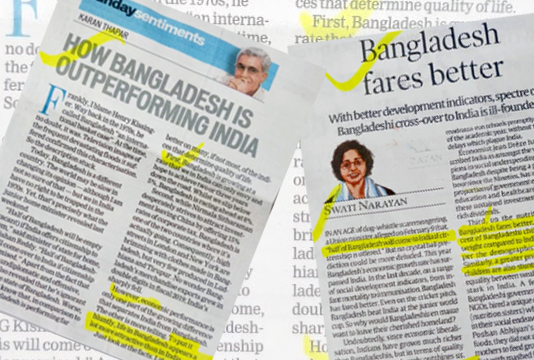By Aminul Islam Mirja
NEW DELHI, Feb 17, 2020 (BSS) – Two prominent Indian columnists Karan
Thapar and Swati Narayan have hit out what it appeared a derogatory comment
against Bangladesh by a junior minister saying on several indicators
Bangladesh was in a better position compared to India.
“It’s more attractive (rather) to be a termite in Bangladesh than a legal
citizen in India,” Thapar said in an article carried yesterday by the
Hindustan Times, blasting Indian junior minister for home G Kishan Reddy’s
remark.
On February 9 Reddy said that “half of Bangladesh will be empty (vacant)
if India offers citizenship to them . . . Half of Bangladeshis will come over
to India if citizenship is promised”.
Thapar, a journalist who particularly earned repute as a television
commentator and interviewer, said by making such a comment Reddy actually
revealed that “he’s ignorant of the true state of Bangladesh”.
“He (Reddy) does not know that in comparison to India, Bangladesh is
performing far better on many, if not most, of the indices that determine
quality of life,” said the columnist in his article titled
“How Bangladesh is outperforming India”.
“Someone should tell Reddy that if the United States of America promises
citizenship, half of Indians will cross over. Actually, it will be far more,”
he wrote.
He added: Be it growth, enhanced investment, life expectancy, literacy,
and health, Bangladesh is doing well.”
Swati Narayan, on the other hand, appeared with her article in the Indian
Express saying “In the last decade, on a range of social development
indicators, Bangladesh has fared better than India”.
“Undoubtedly, since economic liberalisation, Indians have grown much richer
than Bangladeshis, but in terms of quality of life our neighbour (Bangladesh)
largely outshines us,” read her article.
Narayan, currently a visiting fellow at the Institute for Human
Development, wondered “why would Bangladeshis en masse want to leave their
cherished homeland” and wrote “Spectre of a Bangladeshi cross-over to India
is ill-founded”.
Thapar in his commentary said “Bangladesh is growing at a rate that we in
India can only envy and hope to achieve two or three years down the road”.
“Whilst we slip below 5%, Bangladesh is racing ahead at 8%,” he wrote.
Highlighting Bangladesh’s impressive economic growth, increasing literacy
rate, nutrition level and life expectancy, declining child and maternal
mortality rate, Thapar wrote “To put it bluntly,life in Bangladesh appears a
lot more attractive than in India”.
“People migrate to improve their lives, and life in Bangladesh seems
decidedly better,” Narayan said in her article titled “Bangladesh fares
better—with better development indicators, spectre of a Bangladeshi cross-
over to India is ill-founded”.
Narayan echoed Thapar, wondering why a Bangladeshi citizen should come to
India since the country’s economic growth rate has surpassed India.
She cited findings of her own recent doctoral thesis that read “in the
case of Bangladesh, the most prominent factor has been the country’s ability
to dissolve inequalities through sustained investment in public service and
the bridging of social and gender distances”.
“Berating our neighbours with the false bogey of illegal immigrants, in
light of the Citizenship Amendment Act, is nothing but an unjustifiable
Islamophobia distraction,” she wrote.



